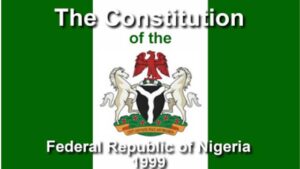Interpreting Section 134(2)(B) Of The 1999 Constitution Of The Federal Republic Of Nigeria.[1]
Section 134(2) (b) provides thus;
A candidate for an election to the office of President shall be deemed to have been duly elected where, there being more than two candidates for the election-
(b) He has not less than one-quarter of the votes cast at the election each of at least two-thirds of all the States in the Federation and the Federal Capital Territory, Abuja.[2]
The question that comes to mind after reading this section is- what is the law trying to say? In a bid to answer this question, we would be looking at the some of the means of interpreting statutes.
Rules of Statutes Interpretation
There are different rules of interpreting statutes. These rules include;
- The Literal Rule of Interpretation.
This is a means of interpreting the law by ordinary or natural meaning of the words of the statutes. In the case of Bronik Motors ltd v Wema Bank[3], Nnamani Jsc held that it is indeed the first of rules of interpretation that words must be given their ordinary, plain and natural meaning.
The court has employed the literal interpretation style in many cases. In R V Bangaza,[4] the court was faced with the issue of interpreting section 319(2) of the Criminal Code. The section provides that;
‘Where an offender who is in the opinion of the court has not attained the age of 17 years has been found guilty of murder, such offender shall not be sentenced to death but shall be ordered to be detained.’
The court in applying the literal rule of interpretation held that the relevant age was at the time of conviction and not the time of the commission of the offence.
Also in Nkwocha V Governor of Anambra state[5], the issue before the court was regarding whether the Governor of Anambra State was the proper authority to execute the power vested in the military Government under the provisions of the Land Use Act, 1978. The court by per Kayode Eso JSC held that the ordinary meaning of the word ‘vested’ would clearly suggest that the land which was vested by Section 1 of the Land Use Act,1978 on the military Governor of the state has now become vested in the civilian Government of the state.
- Golden rule of Intepretation
The golden rule interpretation guides the court where an ordinary interpretation of statute will result into absurdity or ambiguity or defeat the intent of the law makers. The court would have to look at the interpretation of the statute from another point of view in order to achieve the aim of the lawmakers[6].
In Becke v Smith[7], Parke B formulated the golden rule of interpretation and said;
“It is a very useful rule on the construction of a statute to adhere to the ordinary meaning of the words used in the statute up to the grammatical construction unless such is in variance with the intention of the legislature to be collected from the statutes itself or leads to any manifest absurdity or repugnancy, in which case the language may be varied or modified so as to avoid such inconvenience, but no further.”
Thus where a literal interpretation will result to inconsistency or lead to absurdity, the court will take a departure from the literal rule and apply the golden rule. In the case of Council of the university of Ibadan v Adamolekun, the Supreme Court was faced with a jurisdictional issue as to whether it has the power to declare an edict of the Western Nigeria Military Governor void for its inconsistency with a Federal Military Governor’s decree. Section 6 of the constitution (suspension and modification) decree no 1, 1966 ousted the jurisdiction of the court to entertain any matter as to the validity or otherwise of edicts and decrees in Nigeria. Counsel contended that by the literal rule of interpretation of this section, the Supreme court cannot declare the edict void, but the court held that it could not have been intended by the legislature that an inconsistent and therefore void law will be permitted to co-exist with the superior laws, as this will not only be absurd, but be legally anomalous as well. Thus, the Supreme Court in applying the golden rule of interpretation declared the edict void.
- Mischief rule of Interpretation
This rule of interpretation requires the Judge to consider some historical facts and background information in relation to the drafting of statutes in order to discover the intention behind making such law by the legislature.
The Mischief rule was properly laid in the case of Balogun v Salami, where the court in considering the history of the Registration of Titles Act, said that the ban attending to dealings in family land was sale of such land by some members of the family followed by repudiation of the transaction by other members of the family on grounds of absence of the family’s consent. The court held that the purpose of the act was to remove the ban. Thus, it then interpreted the provision in the light of this history. The court further held that for the sure and true interpretation of all statutes in general, the following four things are to be considered:
- What was the common law before the making of the act;
- What was the mischief and defect for which the common law did not provide;
- What remedy hath the parliament resolved and appointed to cure the decease of the common law;
- The true reason of the remedy[8].
This therefore implies that the mischief rule requires a consideration of the state of the law prior to the enactment of the statute sought to be interpreted, the mischief or defect which the old law did not provide for, which made it necessary to enact the statute sought to be interpreted, and the remedy provided by the parliament in the current law to cure the defect or mischief in the previous law[9].
We would now apply the three different ways of interpreting statutes examined to analyse the provisions of section 134(2)(b).
Interpretation
A literal reading of the words of the law as stated below simply means that a candidate who is to be declared winner of a presidential election, must acquire a one -quarter of the total number of votes from two-third of all the states in Nigeria. In this instance FCT is to be regarded as a state. Note that section 299 [10]of the constitution of the federal republic of Nigeria clearly provides that the FCT is to be treated the same way as the other states of the federation.
Section 134(2)(b).
A candidate for an election to the office of President shall be deemed to have been duly elected where, there being more than two candidates for the election-
(b) He has not less than one-quarter of the votes cast at the election each of at least two-thirds of all the States in the Federation and the Federal Capital Territory, Abuja
Section 299
The provisions of this Constitution shall apply to the Federal Capital Territory, Abuja as if it were one of the States of the Federation; and accordingly
On the other hand an application of the golden rule approach to interprete the words of the law give a better insight. We would find that the drafters of the law could not have intended to give a special requirement of one-quarter of votes in the FCT. It would be absurd to interprete the words of the law to mean that a candidate who would be pronounced as the winner of an election must win a one -quarter of the total votes in the Federal Capital Territory.
Lastly when we take a tour into history before this law came into existence, we would find that the reasoning of the drafters at that point is to ensure an accumulation of votes across majority of the total states in the federation by a candidate who is to be declared winner of the presidential election. It is basically to establish the fact that the winner of the election did not just win a region but has been able to draw votes from even the minority in a region.
In conclusion, it is my opinion that the drafters would have never intended to give the FCT a priority over the other states in the federation but rather their intentions would have been to classify the FCT as the same as the other states as provides in Section 299 of the 1999 constitution. This is my position while we await a court clarification of the position of the law.
Faidat Balogun
Associate
AOC
[1] By Faidat Balogun, B.L, LL.B.
[2] Section 134(2)(b) 1999 Constitution of The Federal Republic of Nigeria as Amended.
[3] (1983) ALL N.L.R 272
[4] FSC. 413/1959
[5] (1984) 1 SC NLR 634
[6] 5 Major Rules of Interpretation of Statutes by Edeh Samuel Chukwuemeka ACMC
[7] (1836) 2 M8 W 191
[8] Ibid at 6
[9] ibid
[10] Section 299 1999 Constitution of The Federal Republic of Nigeria as Amended.


